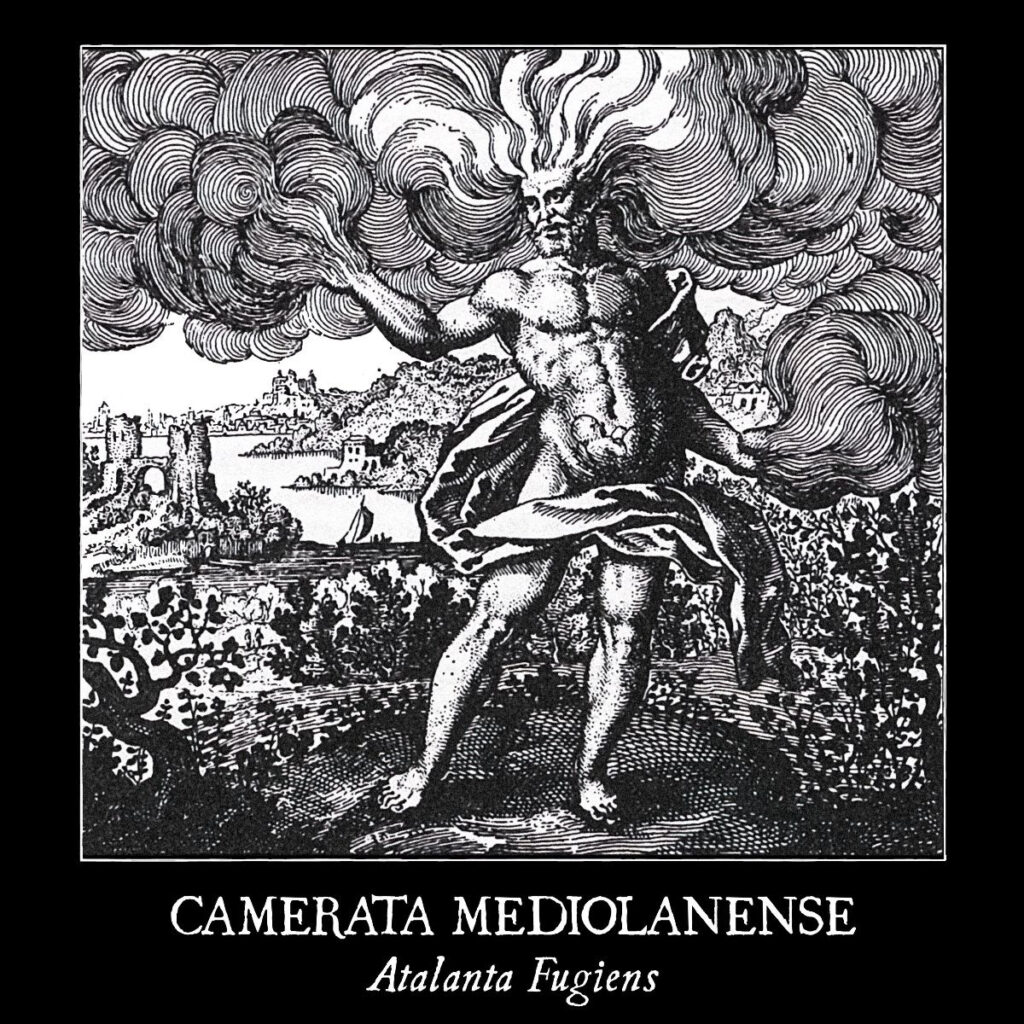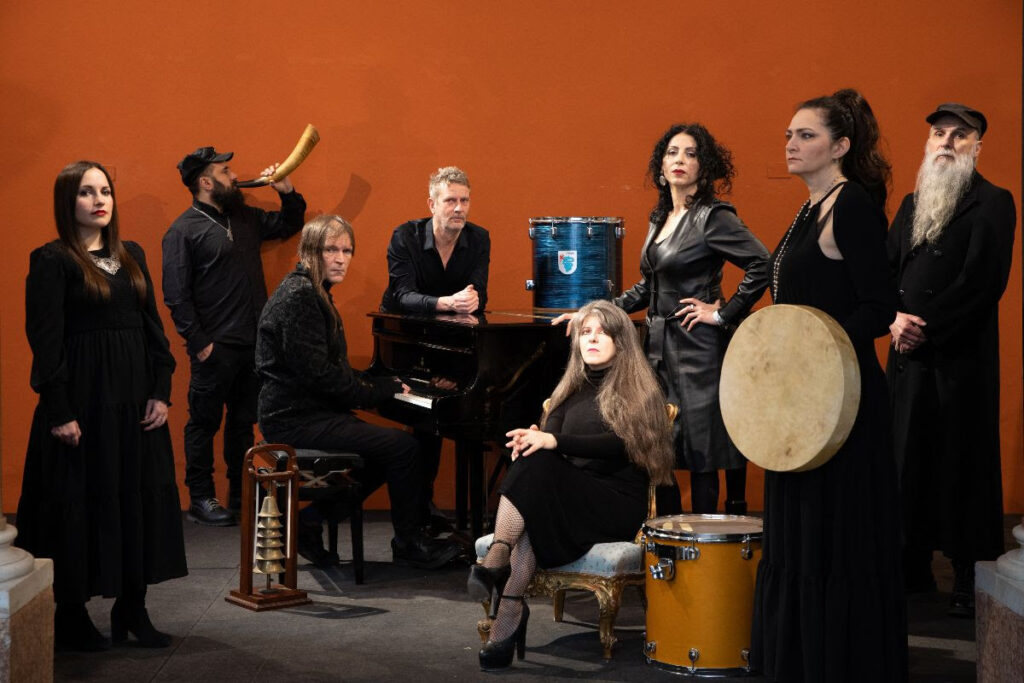CAMERATA MEDIOLANENSE unveil new video single ‘Hermaphroditus’
taken from the forthcoming album “Atalanta Fugiens“
CAMERATA MEDIOLANENSE unveil the occult video clip ‘Hermaphroditus‘ as the second single taken from the Italian ensemble’s forthcoming new album “Atalanta Fugiens” (“Atalante Fleeing”), which is based on an enigmatic alchemist tome and slated for release on June 14, 2024.
CAMERATA MEDIOLANENSE comment: “The song ‘Hermaphroditus’ is based on the thirty-third emblem of the treatise ‘Atalanta Fugiens’ written by the German alchemist Michael Maier and released in 1617”, composer, multi-instrumentalist, and choir vocalist Elena Previdi reveals. “The Hermaphrodite, also called rebis (‘double thing’), is the fruit of a chemical marriage between opposites: the masculine and the feminine, naturally, but also the sun and the moon, hot and cold, blood and milk, gold and silver, or even, as in this passage, sulfur and mercury. The Hermaphrodite therefore represents divine perfection, which is achieved at the cost of unspeakable suffering that underlies the process of transformation of derangement into stillness, and that underlies the conflict between delirium and reason. Musically, a timeless voice starts the tormented alchemical process generated by the two choirs and the two harpsichords. The direction of the music is clear and neat, but at the end the funeral march of the horns makes its way. “
Video credit
Directed by Alan Factotum and Carmen Onophrii

Tracklist
1. Embryo Ventosa
2. Rosetum
3. Rupe Cava
4. Corallus
5. Hermaphroditus
6. Victor Quadrupedum
7. Mercurius
8. Arpie
9. Draco
10. Alta Venenoso

CAMERATA MEDIOLANENSE are one of these extremely rare musical gems that are hard to categorise. The Italians defy all expectations and transcend the usual conventions about formats, style, and how to generally compose and perform music.
With the sixth studio album “Atalanta Fugiens” (“Atalanta Fleeing”), CAMERATA MEDIOLANENSE return to what might be dubbed their ‘classic style’, which means a strong set of percussion from the rhythm section with light touches of the keyboards achieving a perfect balance with the soaring melodies performed by all vocalists consisting of the wonderful sopranos Carmen, Chiara, and Desirée in the lead as well as harmonious choirs.
The Italian ensemble’s often rather martial rhythms are accompanied by high-impact melodies built on ancient scales. Two harpsichords, bass viola, and the recurring presence of disturbing sounds, the unconventional manipulation of reverb and delay as well as the use of noise, all aim to create a sound that touches both the heavenly and the infernal.
It goes without saying that such carefully crafted music with a strong vocal focus is perfectly reflected in fascinating and well-researched lyrics. The album title “Atalanta Fugiens” refers to an eponymous volume that was released at the beginning of the early modern period in 1617. Written by the German physician and alchemist Michael Maier, this emblem book contains 50 discourses with illustrations by Matthias Merian, each of which is accompanied by an epigrammatic verse, prose, and a musical fugue.
Emblem books were popular in Europe during the 16th and 17th centuries. In this context an ’emblem’ means allegorical illustrations with an accompanying explanatory text. After studying the enigmatic book for more than ten years, CAMERATA MEDIOLANENSE composed entirely new music for a selection of emblems (numbers 1, 7, 16, 25, 27, 32, 33, 36, 50) starting with the first and ending with the last. As a tribute to Maier, the ensemble also performed the original three-voice fugue of the final emblem.
Michael Maier (1568–1622) studied medicine and philosophy in Germany and the Italian city of Padua. After getting arrested following a fight, he first returned to Germany and then moved to Prague where his growing interest in alchemy raised him first to the status of councillor to the politically weak Rudolf II of Habsburg. The emperor nonetheless supported the arts and dabbled in the occult, and later ennobled Maier to an Imperial Count Palatine.
CAMERATA MEDIOLANENSE were established in Milan, Italy in 1994 as an ensemble, which also gave the band their name as it literally means a ‘group of chamber musicians from Milan’ – using the ancient Latin name of the city. As a primus inter pares, classically educated composer Elena Previdi has always written most of the music. She is also a much sought after harpsichord player. Not all members of the ensemble come from a classical background. Mostly post-punk, wave, and even traditional music have also played an important part in the band’s musical DNA.
Over the last three decades, CAMERATA MEDIOLANENSE have built an impressive reputation for highly original albums and outstanding concerts that attract connoisseurs and music lovers from widely different scenes. Often viewed as an amalgamation of neo classic and dark wave, the Italians span a much wider range of styles and forms of expression. While the previous full-length “Le Vergini Folli” (2017) leaned stronger to the band’s neo classical side, “Atalanta Fugiens” returns to the wider sonic approach of the earlier albums. Yet, these are only nuances in a most fascinating artistic journey. With “Atalanta Fugiens”, CAMERATA MEDIOLANENSE carry the immense weight and strength of 30 years of creating a unique musical experience way up high to a new shining pinnacle.
Release date: June 14, 2024
Style: Neo Classic, Dark Wave
Label: Auerbach Tonträger
Review impact date: Mai 21, 2024
Line-up
Elena Previdi – keyboards, harpsichord, effects, percussion, virtual instruments, choir
Evor Ameisie – lead vocals, percussion, effects, virtual instruments, choir
Manuel Aroldi – percussion
Marco Colombo – percussion, drums
Désirée Corapi – lead vocals, choir
Carmen D’Onofrio – lead vocals, choir
Chiara Rolando – lead vocals, choir
Giancarlo Vighi – keyboards, harpsichord, accordion, vocals, choir
Guest musicians
Lavinia C. – treble voice in ‘Arpie’ and ‘Follia Del Mondo’
Paolo Siconolfi – bass vocals in ‘Corallus’, ‘Hermaphroditus’, ‘Mercurius’
Giovanna Scarlato – bass viola in ‘Rupe Cava’, ‘Corallus’, ‘Mercurius’, ‘Alta Venenoso’
Vincenzo Zitello – second harp in ‘Hic Leo’
Recording, Mix & Mastering
Paolo Siconolfi at Virtual Light Studio in Vedano al Lambro (Monza, IT)
Artwork taken from a woodcut in the book “Atalanta Fugiens”
Layout by Łukasz Jaszak
Shop
http://lnk.spkr.media/camerata-atalanta
Available formats
“Atalanta Fugiens” is available as 48-page hardcover 2CD artbook with 4 bonus tracks, as an purple organic vinly LP, and as a digisleeve CD.
Links
www.cameratamediolanense.com
www.facebook.com/cameratamediolanense




